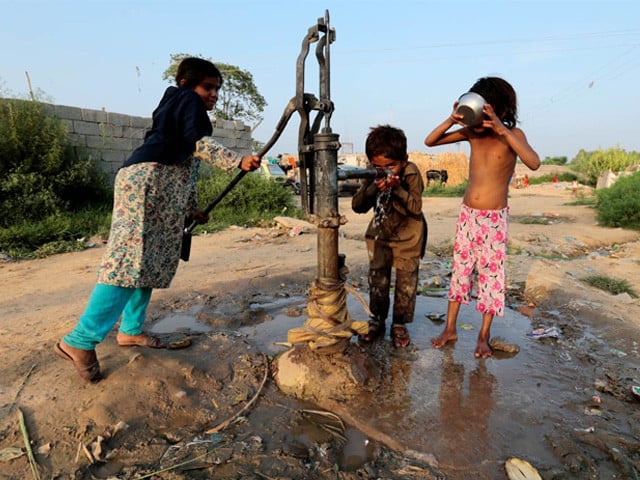Arshad Mahmood Awan
World Water Day, observed annually on March 22, serves as an urgent reminder of the critical water crisis that Pakistan is facing—a crisis that poses a direct threat to food security, public health, and the very survival of future generations. Despite the alarming signs of dwindling water resources, the country continues to neglect long-term water management, which could have devastating consequences for its people and economy.
The indicators of a water crisis are unmistakable: vast regions of the country are already experiencing near-drought conditions, reservoirs are shrinking at an alarming rate, rainfall patterns have become unpredictable, and the existing water management system is under increasing pressure. As of mid-March, the water levels in Mangla reservoir were recorded at 320 meters, its minimum operating level, while Tarbela reservoir stood just 2 meters above its dead level. Chashma reservoir is similarly on the brink of depletion. According to the Indus River System Authority (Irsa), Sindh is facing a 50% water shortage, with Punjab experiencing only marginally better conditions. These shortages are already having a direct impact on agriculture, the backbone of Pakistan’s economy.
The agricultural sector, which depends heavily on water for irrigation, is showing signs of distress. Wheat crops, currently at their final watering stage, are at risk of stunted yields, potentially undermining the country’s food security. Sugarcane, vegetables, and fruit orchards—especially the mango groves in Sindh’s Nara Canal zone—are parched. Cotton, one of Pakistan’s most important cash crops, is also facing delays or compromised sowing, threatening the country’s agricultural exports. Experts have warned that unless water becomes available in the coming weeks, the situation will worsen, resulting in crop shedding, reduced yields, and significant economic losses.
The situation is exacerbated by accelerating glacier melt in the north and unpredictable rainfall patterns in the catchment areas, further aggravating the future water outlook for Pakistan. The country’s reliance on glacial meltwater is becoming increasingly unsustainable as the glaciers continue to retreat due to climate change. Despite these red flags, Pakistan continues to squander its limited water resources through outdated irrigation techniques, wasteful crop choices in arid regions, and unregulated groundwater extraction. Urban water leakage is another issue, wasting valuable resources in cities that are already facing acute shortages.
Pl subscribe to the YouTube channel of republicpolicy.com for quality podcasts:
Pakistan’s per capita water availability has fallen to sub-900 cubic meters—dangerously close to the threshold of absolute water scarcity. This alarming statistic underscores the urgency of addressing the water crisis. Yet, the government’s response has remained largely reactive and politically driven. Water management policies have failed to keep pace with the changing environmental and economic realities, leaving the country vulnerable to future crises.
The need for a comprehensive, proactive water policy is clear. Pakistan must treat its water scarcity as a national emergency, one that requires immediate and sustained action across multiple sectors. One of the first steps should be significant investment in modern irrigation systems, such as drip and sprinkler technologies. These methods are far more water-efficient than traditional flood irrigation, which wastes vast amounts of water. Pakistan must also implement crop zoning policies that discourage the cultivation of high-water-consuming crops in water-scarce regions. This could involve prioritizing crops that require less water, especially in areas that are already experiencing chronic shortages.
The 1991 Water Accord, which governs the distribution of water between the provinces, must be fully implemented in both spirit and detail. This includes the construction of new reservoirs, equitable water distribution mechanisms, and environmental protections to ensure sustainable water use. However, the federal government must move beyond political rhetoric and take concrete steps to enforce these agreements. Additionally, Pakistan’s urban centers must adopt water metering, leak detection systems, and wastewater recycling as standard practices in municipal planning. The inefficient use of water in cities, through leaks and waste, must be curbed to conserve this precious resource.
Groundwater extraction is another critical area that requires immediate attention. Unregulated pumping of groundwater is rapidly depleting aquifers, which are essential for agricultural and drinking water supplies. The government must introduce a regulatory framework for groundwater extraction, including the issuance of permits and the establishment of a pricing system to discourage over-extraction. If left unchecked, the continued depletion of aquifers could lead to severe water shortages in the future.
On this World Water Day, Pakistan faces a stark reality: the country’s survival depends on how it manages its remaining water resources. The failure to address the water crisis in a comprehensive, strategic manner will lead to further agricultural decline, economic instability, and potential social unrest. Pakistan must recognize that water is not just an environmental concern—it is an existential issue. The country is at a tipping point, and the decisions made today will determine the future of its people, its economy, and its environment.
To avert disaster, the government must prioritize water security as a central component of national policy. This requires a shift away from short-term political solutions and toward long-term, sustainable water management strategies. Water conservation, efficient irrigation, better infrastructure, and effective governance must be at the heart of Pakistan’s development agenda.
World Water Day should serve as a wake-up call for Pakistan’s leaders to take immediate action. If the country continues down its current path of water mismanagement, the consequences will be dire—not just for agriculture but for the entire economy and the future of generations to come. Now is the time for Pakistan to commit to bold, decisive action to safeguard its water resources before it’s too late.
















